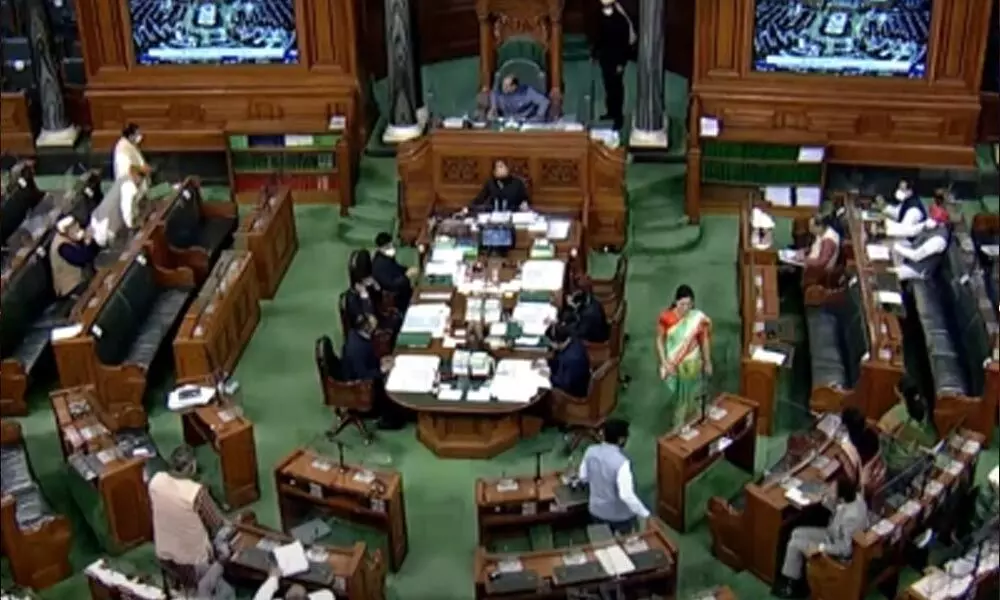Live
- BJP using Waqf issue as ‘political weapon’: K’taka Home Minister
- KSR Bengaluru and Kengeri Railway Stations get escalators
- Sunitha’s long cherished dream to become a reality soon!
- Sakra honours barefoot activist Ajay Oli, expands CSR initiatives to aid underprivileged
- Sudha Murty Celebrates Cultural Values At London's Diwali Gala, Praises Son-In-law Rishi Sunak
- PM Modi Arrives In Brazil For G20 Summit, Set For Key International Engagements
- The Little Book of Big Gains: How Technology Transforms Investing
- Only ineligible BPL cards cancelled, clarifies CM
- TTD EO administered oath as ex-officio member of Trust Board
- Five arrested for stealing old ballot boxes
Just In
Parliament passes Bill extending tenures of CBI, ED Directors


Parliament passes Bill extending tenures of CBI, ED Directors (Photo/IANS)
Parliament has passed the bills extending the tenures of Directors of the Central Bureau of Investigation and the Enforcement Directorate to five years, with the Rajya Sabha passing the measures by voice vote on Tuesday amid a walkout by the Opposition.
New Delhi: Parliament has passed the bills extending the tenures of Directors of the Central Bureau of Investigation and the Enforcement Directorate to five years, with the Rajya Sabha passing the measures by voice vote on Tuesday amid a walkout by the Opposition.
The Central Vigilance Commission (Amendment) Bill, 2021 and The Delhi Special Police Establishment (Amendment) Bill, 2021 - both of which were passed by the Lok Sabha on December 9 - seek to amend the existing laws to give one year extension of the heads of both agencies, up to five years.
Soon after Minister of State for Personnel and Training Dr Jitendra Singh moved the motion, Leader of Opposition Mallikarjun Kharge sought to bring up the issue of suspension of 12 members, but the Deputy Chairman refused to allow this and in protest, opposition members walked out of the House.
During the debate after the opposition had walked out, Janata Dal-United Member Ram Nath Thakur, supporting the bill, also cited an example of a murder investigation pending for 46 years in Bihar to urge that there should also be a fixed tenure within which the investigation be completed.
G.K. Vasan of the Tamil Maanila Congress, Birendra Prasad Vaishya of the AGP, Brijlal of the BJP, Pilli Subhash Chandra Bose of the YSRCP also spoke in support of the Bills.
BJP member Suresh Prabhu stressed the importance of institutions and people who run those institutions. "The laws are made by the Parliament, but implementation is by the institutions and persons running that institution, need to be right. There needs to be a methodology."
He also spoke about money laundering and the role of the ED.
BJP's Sushil Kumar Modi elaborated on various steps taken by the government to rid the menace of corruption and how direct transfer benefits have ensured money directly into the real beneficiaries due to measures taken for transparency.
He also emphasised that the extension will be given only when all three members - the Prime Minister, the Chief Justice of India, and Leader of Opposition/of the largest party in the Lok Sabha - give their consent.
BJP's G.V.L. Narasimha Rao quoted a paragraph from a book by a former CBI Director, who gave example of the Bofors case to show how CBI investigations were subverted by the then Congress government, and other such examples.
Replying to the debate on the first bill, Jitendra Singh said: "History may not forgive us for having abstained from the discussion. And history will also accuse them of having tactically opposed an important anti-graft measure. History may also accuse us of having something to hide and therefore running away from a discussion."
"CBI has so much credibility that somewhere in remote place, a major theft happens, people immediately demand a CBI inquiry. People are misled that the tenure is being extended but in reality, it is an attempt to restrict it to five years unlike earlier provisions which did not put any upper limit," Singh said
"For every extension of one year each, the whole procedure would be followed, and extension would be given by mentioning the reasons on record," he added.
He also gave examples of similar ranks from the UK, Germany, Australia, and Canada where the chiefs either have had longer tenures or no cap.
Replying to the second bill (for the ED), the minister said: "The noble motive to bring the bill stands fully established. But the motive of those abstaining from the discussion is not known."
"In their misguided zeal to oppose Prime Minister Modi, the opposition has gone to the extent of opposing a highly esteemed constitutional institution, which is mandated to protect the national security of India and also mandated to preserve the financial stability of India," he claimed. "Incidentally, but not insignificantly, most of the money laundering cases investigated by this agency belong to those 10 years tenure of UPA I and II and involve some of the high and mighty of those types."

© 2024 Hyderabad Media House Limited/The Hans India. All rights reserved. Powered by hocalwire.com






